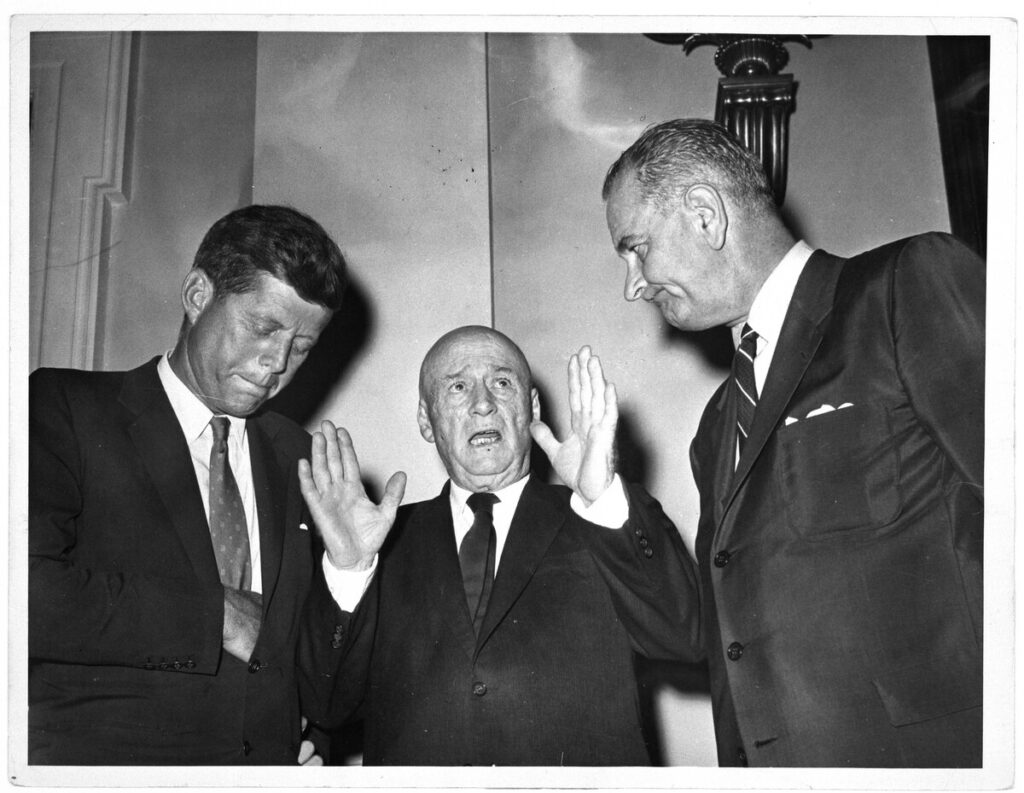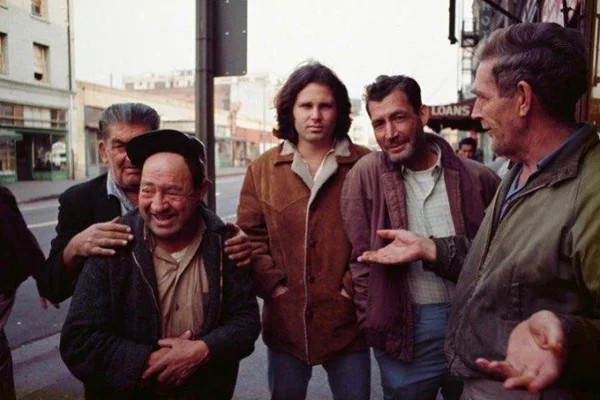How did Democrats lose the White House and almost everything else in 2024? Because Democratic party leaders thought their messaging didn’t stink and, as legendary LBJ mentor Sam Rayburn might have said, ‘They couldn’t tell shit from Shinola.’
Picture this: It is 1961 and fresh-faced, wide-eyed Vice President Lyndon Johnson walks into House Speaker Sam Rayburn’s office, still riding high from his first Cabinet meeting under JFK. He goes on and on about the brilliance in that room, all these high-powered, Harvard-educated geniuses crafting policy, heads brimming with all the theoretical know-how you could ask for.
“Mr. Sam,” he gushes to his political mentor, “I’ve never seen anything like it! McNamara especially—sharpest mind I’ve ever seen.” Rayburn, ever the Texan, leans back and says, “Well, Lyndon, they might all be geniuses, sure. But I’d feel a whole lot better if just one of ’em had run for sheriff once.”

And that, right there, is precisely where national Democrats find themselves post-2024. Kamala Harris’s campaign tanked like it was fitted with a lead jacket, and Democratic Party leaders are left wondering why the party that promises so much feels, to so many, like it delivers so little. Once again, it’s as if Democrats don’t know, as they say, “shit from Shinola.” And here’s the kicker: if someone in the Democratic Party hierarchy had ever run for “sheriff” in the metaphorical sense, maybe we wouldn’t be here.
The story out of Tuesday’s election is clear: Democrats stumbled all over themselves trying to sell messages that, at best, skimmed the surface of what’s keeping voters awake at night. They hung their hats on high-minded values like “protecting democracy” and “safeguarding reproductive rights,” essential as those issues are. But in a world where inflation, border policies, and an uneasy economy are top of mind, these issues didn’t quite resonate as they’d hoped.

To Democratic leadership, losing the White House might have seemed impossible, what with the backdrop of court cases and headlines swirling around Trump. But, to voters, none of it was as pressing as paying the mortgage or the local diner closing down. That’s the thing about running a party in America: voters want leaders who get down to the nitty-gritty—policies that answer, as Sam Rayburn might put it, “What’s in it for me?”
The failure to address bread-and-butter issues wasn’t a first-time mistake, either. It seems every election cycle, the party talks itself into the idea that Americans need to hear about ideas that are noble in theory but impractical in practice—like a lecture on “the protection of democracy.” Now, don’t get me wrong, democracy is important; I, for one, quite like it. But that lofty, abstract rhetoric doesn’t always translate when Americans are worried about paying for groceries.

John F. Kennedy, House Speaker Sam Rayburn and Lyndon B. Johnson during the 1960 presidential campaign. (Courtesy of the Briscoe Center for American History) (Briscoe Center for American History)
In Harris’s case, her campaign leaned into abortion rights as if that were the “sheriff” test for 2024. But for many voters, abortion isn’t the only issue on their minds; they’re also worried about the cost of living, their communities, and feeling secure. Yet the campaign went full throttle on identity politics. The optics of “I’m running because I’m a woman, and I’m a minority” might feel resonant to some in the party, but they’re not winning over everyone else. To many Americans, that’s just not the central qualification they’re looking for. They want someone who gets their issues and speaks plainly.
This election was a harsh reminder of what happens when the message misses the mark. Democrats lost ground just about everywhere: in cities and suburbs, college towns, and rural counties. The New York Times analysis even noted that most of the nation’s 3,100 counties swung right. Here we have Kamala Harris, supposedly poised for a historic win, facing a total meltdown of support in places that just four years ago went blue. And it wasn’t only about Harris. This pattern—detachment from the average voter’s real-life worries—seems ingrained in the party’s DNA.
Some Democrats might argue that their 2024 strategy was born of necessity. With a convicted Trump on the ticket, the stakes were indeed high, and they went for the jugular with issues they felt were too urgent to ignore. But where Democrats went wrong was assuming everyone else would find these issues as motivating as they did. In the end, they looked like a party so convinced of its own moral clarity that it forgot to make a persuasive case to voters who didn’t already agree.
The miscalculation reminds me of the “two Americas” narrative that reappears with every election. You’ve got coastal, urban America, where the concerns lean progressive and the values are high-minded. And then you’ve got middle America, where what matters is whether a candidate can relate. The Democrats keep trying to win the first America while forgetting to talk to the second.
So, what’s next for the Democratic Party? They could do worse than taking a page from Rayburn’s playbook: maybe vetting a few candidates who’ve “run for sheriff,” metaphorically speaking. You want a political comeback? It’s going to take someone who’s got the brains but also understands how to campaign in diners and town halls, rather than just on Twitter and in think tanks. It’s going to take someone who can talk immigration, inflation, and the border, not just abstract concepts like “protecting democracy.”
The good news is the Democrats’ problem isn’t one of values; it’s one of messaging. Many Americans do care about reproductive rights and democracy. But when that’s all a party talks about, it can start to feel disconnected from voters’ daily realities. Democrats need to stop assuming their worldview is self-evident and start doing the hard work of actually winning hearts and minds on these issues.
If LBJ were here today, he might remind us that while brains and education matter, they don’t make up for street smarts or relatability. If Democrats want to learn from Tuesday’s fiasco, they’ll need to do what they’ve been reluctant to: engage with every part of America, understand those concerns on a visceral level, and speak to them as if they mattered.
A winning party doesn’t preach; it listens and then offers answers. There’s a great quote by Rayburn that seems to encapsulate this: “A jackass can kick a barn down, but it takes a carpenter to build one.” Democrats need to find their carpenters—people who’ll build up trust in places they’ve neglected and who can speak to voters’ concerns in ways that aren’t just eloquent, but practical.
It may be a long road ahead for the Democratic Party, but perhaps a humbling loss will push them to learn from their mistakes. They’ve got the ideas and the candidates, but they need to learn how to talk like they’re running for sheriff. Or, at the very least, stop kicking down the barn.
TONY CASTRO, the former award-winning Los Angeles columnist and author, is a writer-at-large and the national political writer for LAMonthly. org. He is the author of the forthcoming novel The Book of Marilyn. He can be reached at tony@tonycastro.com.





